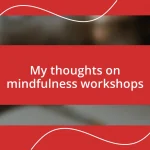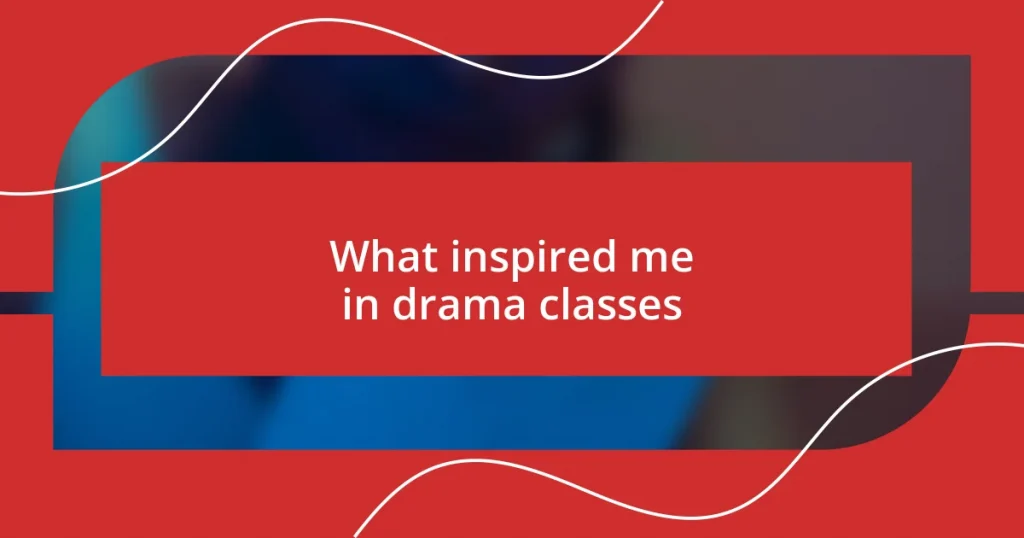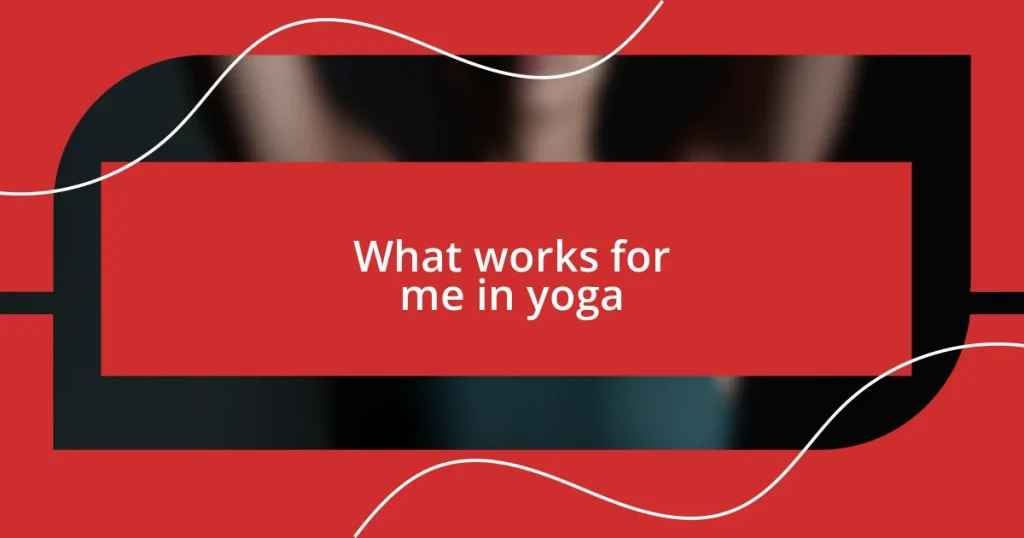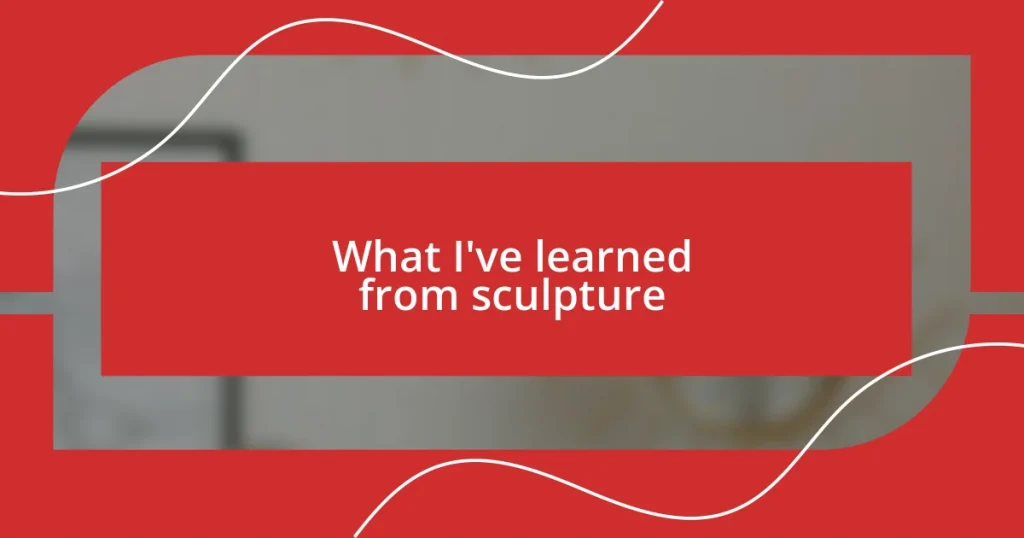Key takeaways:
- Initial drama class experience led to personal liberation and newfound joy in expressing emotions.
- Participating in drama improved communication skills, boosted self-confidence, and fostered lasting friendships.
- Key techniques learned, such as physicality, improvisation, and character analysis, enhanced empathy and personal growth.
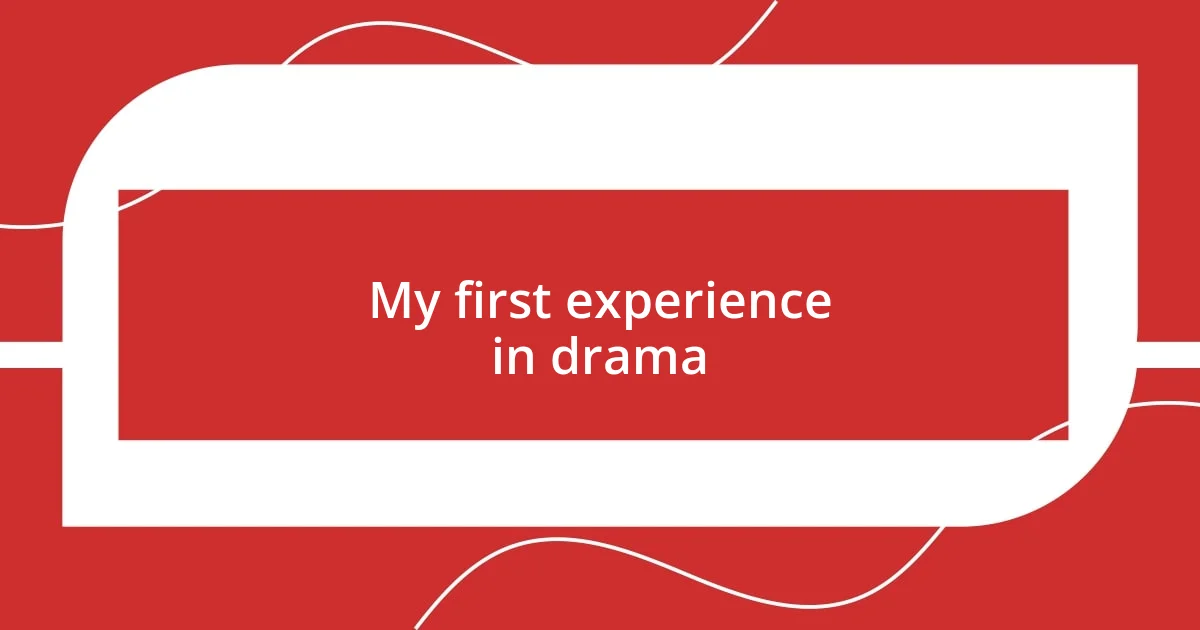
My first experience in drama
I still remember my first drama class vividly. Walking into that small, dimly lit room, I felt a cocktail of excitement and nerves swirling in my stomach. Was I ready to step into a new world, to explore different characters and emotions?
As we began with simple warm-up exercises, I found myself letting go of my inhibitions, discovering the freedom that came with each movement and improvisation. I can clearly recall the moment when I transformed from a timid observer to an active participant, losing myself in the character I was portraying, a quirky shopkeeper who saw life through a comedic lens. It was liberating; I felt a rush of joy that resonated deeply within me.
By the end of that first class, I realized that drama wasn’t just about acting; it was about understanding myself and others on a profound level. I wonder if my classmates felt the same way. Did they realize how powerful it was to express their feelings and thoughts through the art of storytelling? Each laugh, each pause, and every moment of connection changed the atmosphere in that room, igniting a passion for drama that has only grown since then.
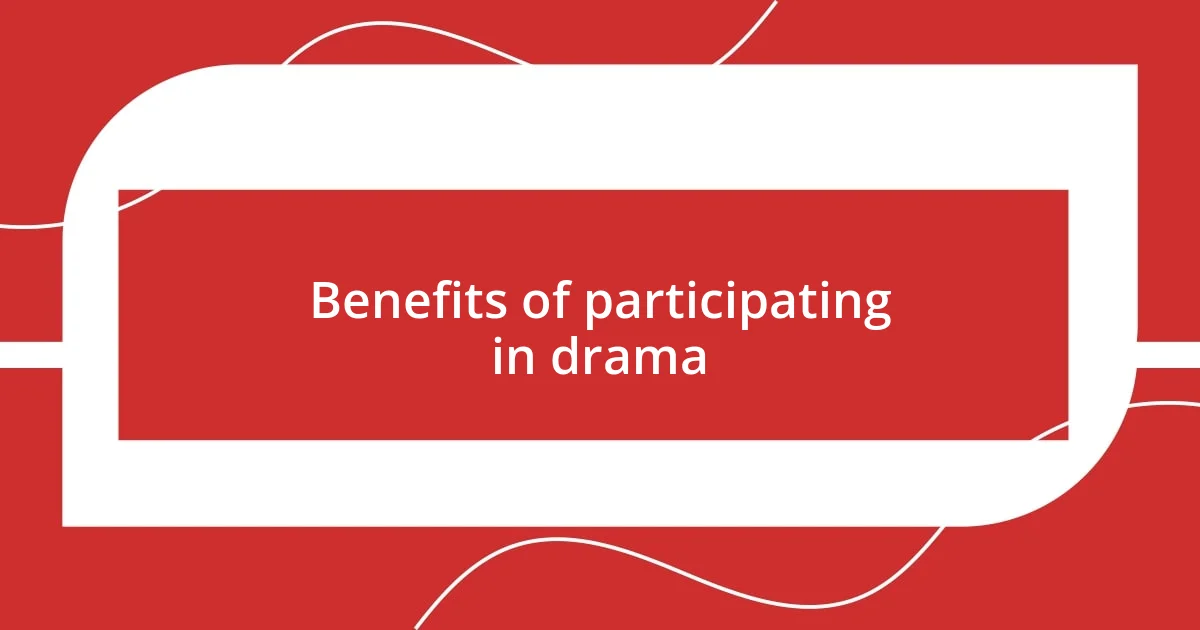
Benefits of participating in drama
Participating in drama has been a significant thread weaving through my life. One of the most profound benefits is the enhancement of communication skills. I remember rehearsing for a scene where I had to deliver a monologue about loss. The emotional depth required made me articulate my thoughts clearly, conveying not just words but emotions. By the end of that process, I noticed a remarkable shift in my ability to express myself in everyday conversations. It’s fascinating how sharing stories on stage prepares you for genuine connections off-stage.
Another payoff is the profound boost in self-confidence that comes with performing. I used to feel shy in social settings, but when I first stepped onto the stage, I transformed into someone entirely different. With each performance, my confidence expanded. I remember the butterflies in my stomach before the curtain opened, but the applause and cheers afterwards felt like a warm embrace. It genuinely builds a fortitude that spills over into all areas of life, making challenges feel less daunting.
Lastly, drama fosters an incredible sense of community. I distinctly remember the camaraderie during group rehearsals where we shared laughs, supported each other, and faced the inevitable hiccups together. Those bonds created an environment of trust that extended beyond rehearsals. Now, when I look back, the friendships formed through those late-night practices and shared flops are some of my dearest connections. Drama isn’t just a performance; it’s a shared journey that enriches personal lives collectively.
| Benefit | Personal Experience |
|---|---|
| Improved Communication Skills | Articulating emotions while rehearsing a powerful monologue deepened my everyday conversations. |
| Boost in Self-Confidence | Stepping onto stage transformed my self-image; each applause felt like a victory that built resilience. |
| Sense of Community | Shared rehearsals fostered friendships that continue beyond the stage, creating lasting connections. |
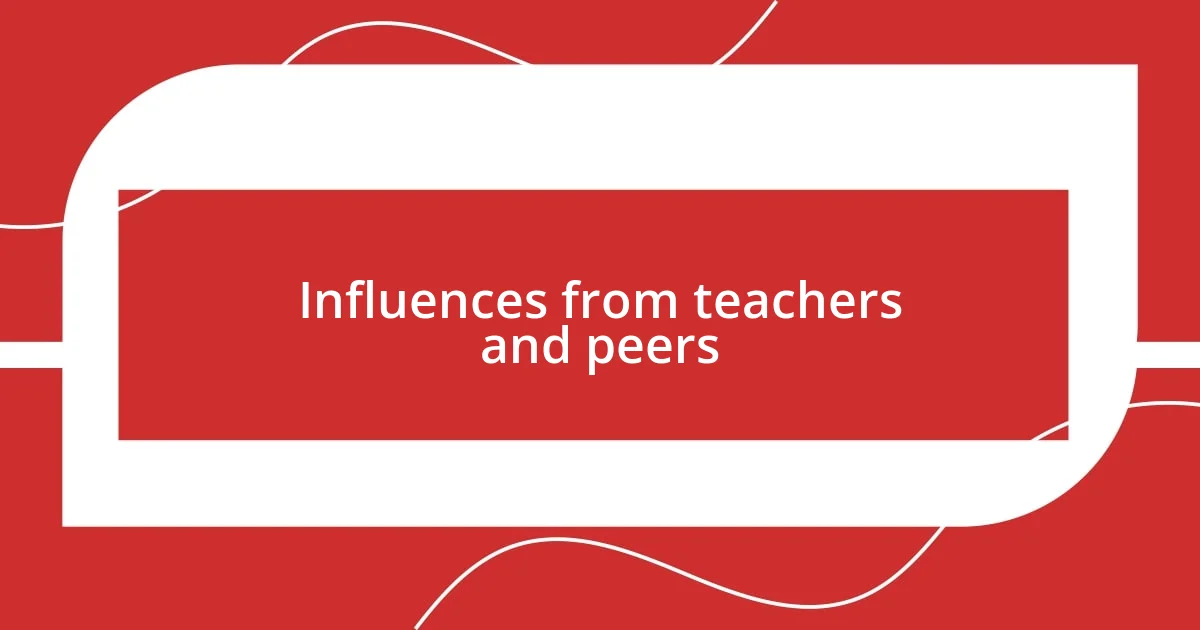
Influences from teachers and peers
The influence of teachers and peers in my drama classes was nothing short of transformative. I recall one particular teacher who introduced us to the power of vulnerability in performance. Watching her embody deeply personal characters made me realize that drama wasn’t just a series of lines to memorize; it was an exploration of identity and emotion. Her guidance encouraged me to dig deeper and express emotions I often kept buried, awakening a greater understanding of myself and my fellow actors.
My peers played a crucial role in this journey as well. Their support and creativity inspired me to push my boundaries. During one group exercise, we supported one another in improvisation, where spontaneity led to genuine laughter and unexpected tears. It truly felt like we were co-creating art together. It was in these moments of collaboration that I learned the significance of trust in performance. Here are a few specific ways my teachers and classmates influenced me:
- Emotional Richness: A teacher’s emphasis on emotional authenticity opened my eyes to the depth of each character.
- Collaborative Spirit: Peers encouraged each other to take risks, turning rehearsals into safe spaces for exploration.
- Constructive Feedback: Honest critiques from teachers motivated me to refine my craft, fostering growth and resilience.
- Enduring Connections: The friendships formed through shared experiences created a supportive network that continues today.
These influences, both from my instructors and colleagues, shaped not just my approach to acting but also nurtured my personal growth in ways I couldn’t have anticipated.
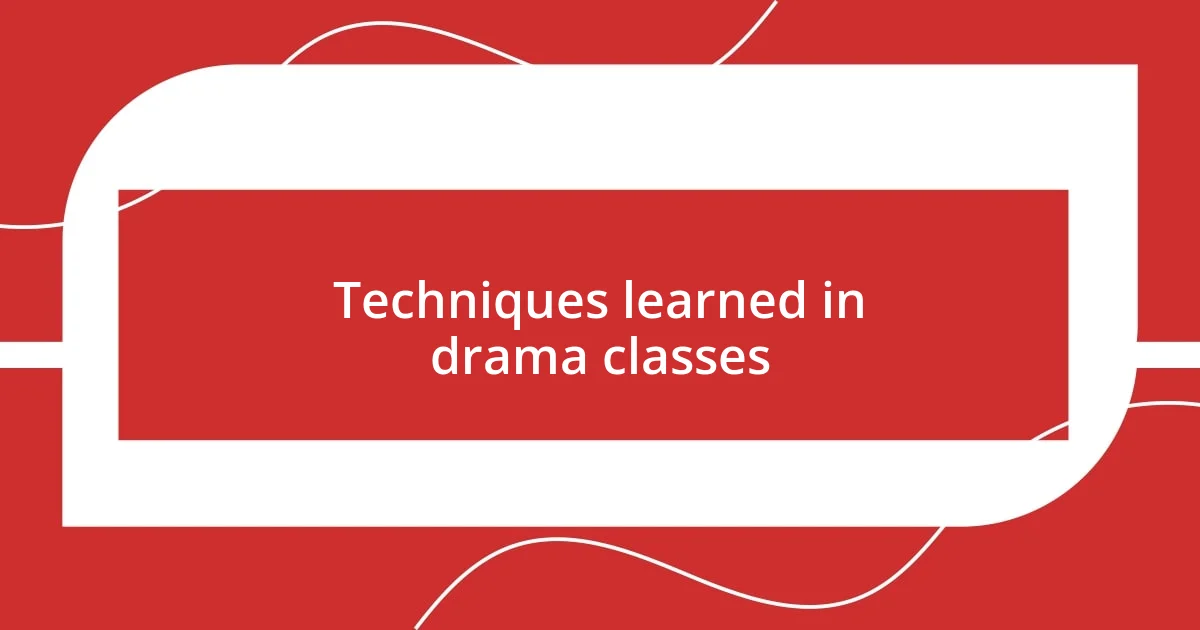
Techniques learned in drama classes
One of the most impactful techniques I learned in drama classes was the art of physicality in performance. I still recall an exercise where we had to communicate emotions solely through body language. It was eye-opening to realize how much a subtle shift in posture or movement could convey a character’s state of mind. This technique helped me understand the importance of non-verbal cues, both on stage and in my daily interactions. Have you ever noticed how someone’s stance can shift the entire energy of a conversation? I found myself becoming more aware of these nuances in others, which enhanced my empathy.
Another key technique was improvisation, which taught me to think on my feet. I remember a particular session where the instructor threw a random scenario at us, and we had to create a scene without any prior preparation. It was nerve-wracking but exhilarating at the same time! This experience pushed me to shed my fear of making mistakes and to embrace the unexpected. I learned that some of the most memorable moments in performance emerge from spontaneity. Isn’t it fascinating how letting go can sometimes lead to the most authentic expressions?
Finally, character analysis was a game-changer for me. I vividly remember delving into the background and motivations of a character I was playing. By exploring their history and desires, I connected with them on a deeper level. This technique not only enriched my performances but also enhanced my understanding of people around me. Everyone has a story—what’s yours? Engaging with character analysis reminded me that every individual has layers that shape their actions, which has made me more empathetic in my everyday life.
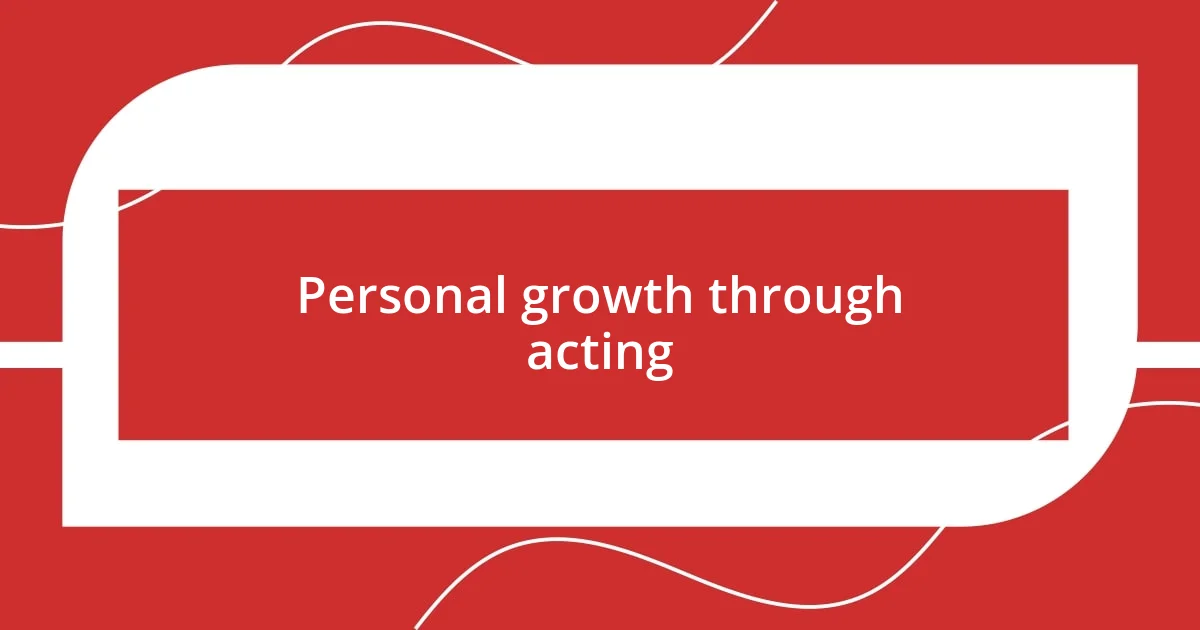
Personal growth through acting
Acting has profoundly contributed to my personal growth, often in ways I hadn’t anticipated. I remember my first time on stage, trembling with nerves but driven by an undeniable rush of excitement. As I delivered my lines, something shifted within me. I discovered a newfound confidence that not only enhanced my performances but seeped into my everyday interactions. Have you ever felt that moment when you surprise yourself? That adrenaline was my gateway to a deeper sense of self.
Embracing vulnerability became a key aspect of my journey. Once, during a scene where I had to portray deep sorrow, I found myself tapping into my past experiences. It was cathartic. I understood that acting isn’t just about wearing a mask but rather peeling away layers to reveal our true emotions. This realization helped me not only on stage but also in life—allowing me to connect with others in more meaningful ways. I often ask myself, “How much can we grow by simply being honest with our feelings?”
The collaborative nature of drama classes also played a significant role in my development. I remember a performance where I had to trust my scene partner completely to convey a complex emotional storyline. That sense of connection and mutual support made me appreciate the importance of teamwork. It felt like we were crafting something beautiful together. This experience taught me that personal growth often happens in the company of others. Have you ever felt how shared experiences can elevate your understanding of yourself? In drama, these moments were a constant reminder that growth blooms in a nurturing environment.









